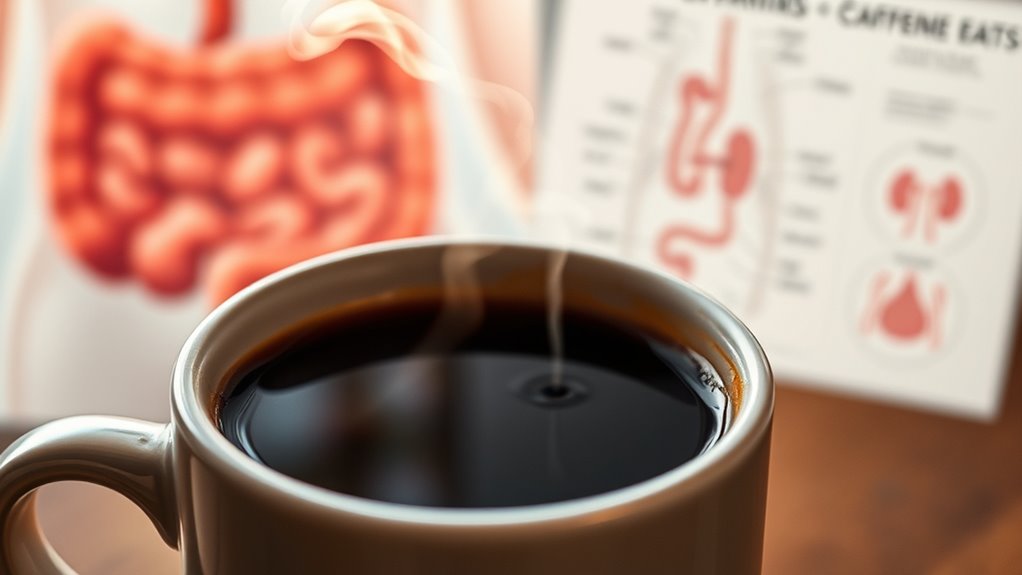Caffeine works by stimulating your central nervous system. It blocks adenosine receptors in your brain, reducing fatigue and increasing alertness. This action boosts dopamine levels, enhancing your mood and cognitive performance. You’ll feel the effects within 30-60 minutes, which can improve your energy and focus. However, keep in mind that too much caffeine can lead to anxiety or disrupted sleep. Want to learn how it impacts other aspects of your health?
Key Takeaways
- Caffeine acts as a central nervous system stimulant by blocking adenosine receptors, reducing fatigue and enhancing alertness.
- It boosts dopamine levels, improving mood and cognitive performance, with noticeable effects within 30-60 minutes of consumption.
- Caffeine enhances physical performance by increasing endurance and reducing perceived effort, particularly at doses of 3-6 mg per kilogram of body weight.
- It can temporarily raise heart rate and blood pressure, but moderate consumption is generally safe for most individuals.
- Pregnant individuals should limit caffeine intake to under 200 mg daily to avoid potential negative effects on fetal development.
Mechanism of Action: How Caffeine Affects the Brain

When you consume caffeine, it quickly enters your bloodstream and reaches your brain, where it primarily acts as a central nervous system stimulant.
Caffeine blocks adenosine receptors, preventing fatigue and promoting alertness. This action leads to enhanced mood and cognitive performance, as it increases dopamine levels, which can also lower the risk of depression.
Caffeine enhances mood and cognitive performance by blocking adenosine receptors and increasing dopamine levels.
You’ll notice a boost in your mental sharpness within 30-60 minutes of consumption. However, be cautious with your intake; excessive caffeine can lead to increased anxiety and disrupted sleep patterns.
Since caffeine’s half-life ranges from 2.5 to 4.5 hours, individual factors like genetics and lifestyle play a role in how long its stimulating effects last, so moderation is key for best benefits.
Effects on Energy and Alertness

When you consume caffeine, it blocks adenosine receptors in your brain, which helps you feel more awake and alert.
This action not only boosts your energy levels but also enhances your cognitive function, making tasks seem easier to tackle.
You’ll likely notice these effects peak about 30-60 minutes after your first sip.
Adenosine Receptor Blockage
Caffeine’s ability to block adenosine receptors plays a crucial role in how energized and alert you feel throughout the day. By inhibiting adenosine, caffeine prevents fatigue and promotes wakefulness, allowing you to tackle your tasks more efficiently. This blockage increases the release of neurotransmitters like dopamine and norepinephrine, boosting your mood and energy levels.
| Effect | Description |
|---|---|
| Adenosine Blockage | Prevents fatigue and promotes alertness |
| Neurotransmitter Release | Increases dopamine and norepinephrine levels |
| Peak Blood Levels | Occur 30-60 minutes post-consumption |
| Tolerance | Habitual users may need higher doses for the same effect |
| Metabolism | Half-life of caffeine varies from 2.5 to 4.5 hours |
Regular consumption can affect your metabolism, impacting overall alertness.
Increased Energy Levels
Although you mightn’t realize it, the boost in energy levels you experience after consuming caffeine is a direct result of its action on your brain. Caffeine consumption stimulates your central nervous system by blocking adenosine receptors, which helps prevent fatigue and enhances alertness.
Within 30-60 minutes, you’ll likely notice increased energy levels and improved mood. For healthy adults, moderate caffeine consumption—up to 400 milligrams daily—can also enhance physical performance by increasing endurance and reducing perceived effort during activities.
However, keep in mind that regular use can lead to tolerance, meaning you might need higher doses to achieve the same stimulating effects. Overall, caffeine greatly impacts your energy and alertness, making it a popular choice for many.
Enhanced Cognitive Function
The boost in energy you get from caffeine doesn’t just stop at physical performance; it also plays a significant role in enhancing cognitive function. By blocking adenosine receptors in your brain, caffeine reduces fatigue and increases alertness. Within 30-60 minutes of consumption, you’ll likely notice improved memory and faster reaction times. Regular intake can even lower the risk of neurodegenerative diseases like Alzheimer’s and Parkinson’s. However, keep in mind that your tolerance levels can affect how caffeine impacts you.
| Effect | Description |
|---|---|
| Alertness | Increased mental focus |
| Memory | Enhanced recall and retention |
| Reaction Times | Faster responses in tasks |
| Fatigue Reduction | Lower feelings of tiredness |
Caffeine and Physical Performance

When you consume caffeine, it can greatly boost your physical performance by enhancing endurance and decreasing the perception of effort during workouts.
Studies show that a dose of 3-6 mg per kilogram of body weight can markedly improve your endurance, with peak effects occurring 30-60 minutes after consumption. Caffeine stimulates the release of adrenaline, increasing energy availability and improving your reaction times.
For habitual users, the ergogenic effects are even more pronounced, as they develop a tolerance that maximizes caffeine’s performance-enhancing properties. Additionally, caffeine enhances mental focus and cognitive function, helping you stay sharp and motivated during intense exercise.
Impact on Heart Health

When you consume caffeine, you might notice a temporary increase in your heart rate and blood pressure.
This happens because caffeine boosts adrenaline levels, but these effects usually don’t last long.
If you have any heart conditions, it’s wise to check with your doctor about how much caffeine is safe for you.
Caffeine and Heart Rate
Although caffeine can temporarily elevate your heart rate, moderate consumption is generally safe for most people and unlikely to cause long-term heart health issues.
When you consume caffeine, you might notice a short-term increase in both heart rate and blood pressure. However, research shows that in healthy adults, these effects don’t lead to arrhythmias.
It’s important to be cautious with energy drinks, as their high caffeine content can cause abnormal heart rhythms. If you have pre-existing heart conditions, consult your healthcare provider about your caffeine intake.
Also, keep in mind that withdrawal symptoms can occur if you suddenly cut back on caffeine, which may affect your heart rate temporarily.
Enjoying caffeine in moderation is key to maintaining heart health.
Blood Pressure Effects
Caffeine can temporarily raise your blood pressure by increasing adrenaline levels, which may concern those monitoring their heart health. When you consume caffeine, especially in excessive amounts, it can lead to a faster heart rate and heightened blood pressure.
However, for most healthy individuals, moderate caffeine intake—up to 400 milligrams per day—doesn’t greatly increase the risk of hypertension or heart disease.
It’s important to take into account that people with pre-existing heart conditions should consult their healthcare provider about caffeine, as it might worsen their symptoms.
Additionally, energy drinks, often packed with caffeine, can lead to abnormal heart rhythms and elevated blood pressure.
Individual factors like genetics and smoking status also affect how caffeine impacts your cardiovascular system.
Influence on Digestion and Urination

While many people enjoy a cup of coffee or tea for its stimulating effects, they might not realize how caffeine can impact digestion and urination. Caffeine increases stomach acid production, which can lead to symptoms like heartburn, especially in those with acid reflux. As a diuretic, caffeine promotes increased urination, making bathroom trips more frequent after consumption. Caffeine doesn’t get stored in your body; it’s metabolized in the liver, with half eliminated within four to six hours. Understanding these effects can help you manage your caffeine intake better.
| Effect | Description | Symptoms |
|---|---|---|
| Stomach Acid | Increases production | Heartburn, upset stomach |
| Urination | Promotes frequent bathroom visits | Increased urgency |
| Metabolism | Eliminated within 4-6 hours | N/A |
Considerations for Pregnant Individuals

When considering how caffeine affects your body, pregnant individuals must pay special attention to their intake.
Pregnant individuals should carefully monitor caffeine intake to support healthy fetal development.
It’s recommended to limit caffeine intake to less than 200 milligrams per day. High caffeine intake can negatively impact fetal development and increase the risk of miscarriage.
Remember, caffeine easily crosses the placenta, potentially affecting fetal heart rate and metabolism, especially during early pregnancy when fetal organs are forming.
Pregnant individuals experience slower metabolism of caffeine, particularly in the third trimester, leading to higher caffeine levels. This can interfere with estrogen production and metabolism, posing further complications.
Always consult healthcare providers about your caffeine consumption to guarantee it aligns with your health needs and promotes healthy fetal development.
Frequently Asked Questions
What Does Caffeine Do to Your Body?
Caffeine affects your body by boosting alertness and reducing fatigue. It blocks adenosine receptors in your brain, which can lead to feelings of happiness and increased energy.
You might notice improved exercise performance, as it enhances endurance and makes workouts feel easier.
However, be mindful, as it can also increase stomach acid, potentially causing digestive issues, and act as a diuretic, leading to more frequent bathroom trips.
Moderation is key!
How Does Caffeine Work Exactly?
Isn’t it ironic? You drink caffeine to feel energized, yet it can mess with your sleep.
When you consume caffeine, it quickly enters your bloodstream, blocking adenosine receptors in your brain. This process makes you feel alert and awake. As your body metabolizes it, caffeine can heighten mood and enhance memory.
However, if you’re not careful with timing, you might find yourself tossing and turning when bedtime rolls around.
What Organ Removes Caffeine From the Body?
The liver‘s your go-to organ for removing caffeine from your body. It processes caffeine using enzymes, breaking it down into various metabolites.
After that, your body excretes these metabolites primarily through urine. Depending on individual factors like genetics and hormonal changes, the time it takes for your body to eliminate caffeine can vary.
What Are 5 Side Effects of Caffeine?
When you consume caffeine, you might experience several side effects.
First, it can increase your heart rate and blood pressure, which may be concerning if you have heart issues. You could also feel jittery or anxious, affecting your mood.
Additionally, caffeine acts as a diuretic, leading to dehydration if you don’t drink enough water.
Finally, if you suddenly stop, you might face withdrawal symptoms like headaches and fatigue.
Conclusion
In the grand scheme of your daily routine, caffeine can be your trusty sidekick, boosting your energy and sharpening your focus. While it can enhance your workouts and keep your heart ticking in rhythm, it’s wise to enjoy it in moderation, especially if you’re expecting. So, as you sip that warm cup, remember to savor the perks while staying mindful of how it interacts with your unique body. After all, a little balance goes a long way!









